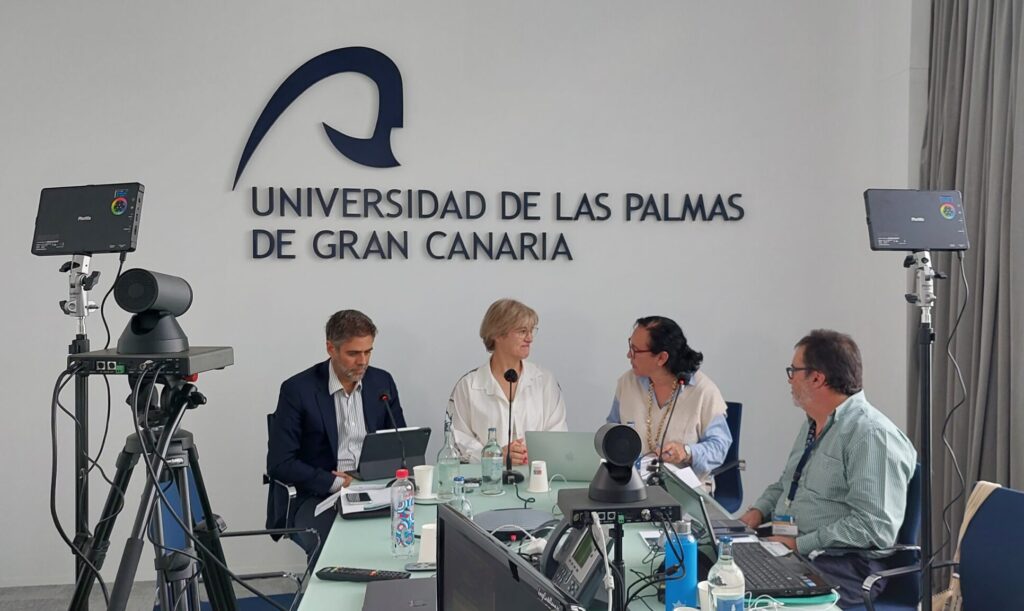
The two days of work had a high participation and presentation of initiatives that were of interest to both the attendees and the speakers who interacted a lot with each other. As a summary, we can conclude with the following aspects addressed:
- Importance of the tourism sector (example INCIRCLE project), agriculture (example VERCOCHAR project), biowaste management (example SCALIBUR and HOOP projects) and aquatics (example ISLANDAP ADVANCED project) as engines of development of the local circular economy and bioeconomy, standing out in all hence the importance of desalination in island contexts (example E5DES project). In the case of the ORs, comments were made on other emerging sectors to consider in promoting CE, such as biotechnology and biodiversity (example BIOGEARS project).
- Reflections were launched on the importance of having the greatest number of local stakeholders that converge around a single work package to be developed. Also noteworthy is having the most active-proactive participation of society as direct participants in the initiatives and results, for which it is convenient to have specific indicators for the different CE objectives to be addressed.
- It is noted the many work platforms that are emerging from the different projects in the Regions (SMART ISLAND HUB – Madeira; RECIS NETWORK of EC in the Canary Islands; ISOPLEXIS – Madeira; DESAL+ – Canary Islands; NICTEAM LAB – Cape Verde) , a reflection of the growing interest in sustainability in the ORs.
- EC, remember that it is an economic concept, therefore business, but that it must have a direct positive impact on society as a whole.
- R&D from companies (YES/NO) and how to move forward on this issue is essential if we want to bet on a real and useful CE for everyone.
- Increasing and making the University-Company relationship more direct is something that we still have to reflect on among those interested in the object.
- Continue advancing in generating opportunities for start-ups and small companies in their beginnings, especially from the R&D centers
- Considering that there are about 2 years left to separate bio-waste, it is worth bearing in mind transversal aspects such as sustainable mobility, water management and energy efficiency in their EC management.
- Very little done in general in logistics and EC. Logistics as an important issue to be developed at the island level and perhaps led by the companies themselves.
- According to some speakers, the convenience of starting with very local solutions and technologies that are not so new and advanced, but with more direct and simple structures and actions related to local actors in the value chain, is valued
The final discussion table with the speakers addressed the issue of the state of R&D&i in the regions focused on local companies, in their initial phases of entrepreneurship in circularity (THE TOMORROW COMPANY –PHYTOALGAE – Madeira), and others with considerable penetration already in the regions (AREHUCAS – Canary Islands; AYAGAURES – Canary Islands; FAZENDA de CAMARÃO – Cape Verde), with the aim of advancing in the development of a real and useful circular economy, focusing on the interest that the companies to develop their own R&D, supported by research centers and/or universities. In this sense, the company AYAGAURES MEDIOAMBIENTE S.L.U., highlighted the initiative developed for the production of biodiesel from recycled oil, tested in the hotel sector, with the support of the ITC as a research center, given that in their specific case they consider that the company does not has the research capacity (facilities, technologies, HR, etc.) that can make this type of project profitable. As conclusions of the speakers, representatives of local companies indicated that currently the company does not have the capacity to investigate by itself, they need to go hand in hand with the research center and take advantage of its technology.
Finally, the focus was placed on financing opportunities in business R&D and industrial transformation, the ACIISI representative commented on the observations from Europe regarding the imbalance that exists in research towards the public system, and the need to increase research in the business sector with ERDF funds related to RIS3.
For those interested in reviewing the webinar, it is available at the following links;
Initial Conference – ISLANDAP ADVANCED: Circular Economy and Research in Isolated Territories
Final Conference – ISLANDAP ADVANCED: Circular Economy and Research in Isolated Territories
